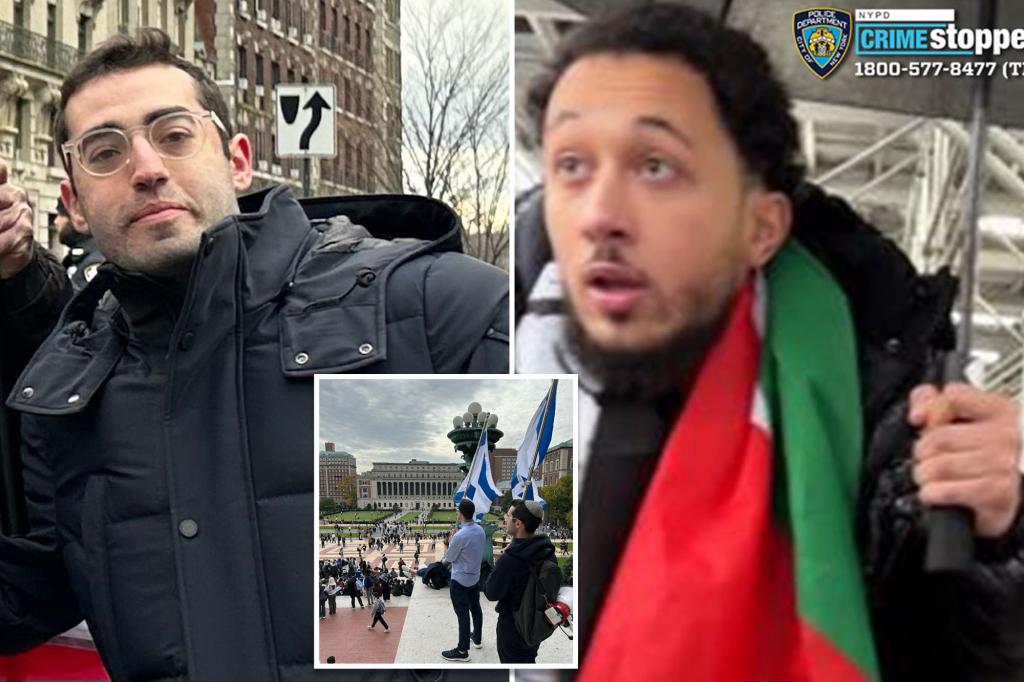This incident at Columbia University underscores the rising tensions surrounding the Israeli-Palestinian conflict and the disturbing trend of antisemitism manifesting on college campuses. Jonathan Lederer, a 22-year-old computer science student at Columbia, found himself the victim of a hate-fueled assault while attending an anti-Israel protest outside the university’s gates. Lederer, accompanied by his brother, was carrying an Israeli flag, a symbol that quickly became the focal point of the ensuing confrontation. A demonstrator, described as wearing a keffiyeh, a traditional Arab headdress, snatched the flag from Lederer’s brother, escalating the situation into a physical altercation. When Lederer intervened, the flag-snatching demonstrator punched him in the face, leaving Lederer injured and shaken.
The assault was not merely a physical act of violence but a culmination of hateful rhetoric and antisemitic tropes. Prior to the physical attack, Lederer was surrounded by protesters who accused him of being a “baby killer” due to his support for Israel. He attempted to de-escalate the situation by expressing his desire for a two-state solution and emphasizing his belief in peace and coexistence. However, his pleas were met with further hostility and antisemitic remarks. Protesters denied Jewish historical ties to the land, accusing Jews of stealing land and echoing historical revisionist narratives often used to delegitimize Israel’s existence. Adding to the inflammatory rhetoric, the attacker compared Lederer to a Nazi, a particularly chilling accusation given Lederer’s family history; his great-grandparents perished in the Holocaust. This blatant distortion of history, equating a victim of historical persecution with the perpetrators of that very persecution, highlights the insidious nature of the antisemitism on display.
This incident was not an isolated event for Lederer. Just months prior, in April, he was targeted at another anti-Israel protest outside Columbia University. In that instance, protesters set his Israeli flag on fire and pelted him with rocks, resulting in facial injuries. The recurrence of such violent incidents targeting Jewish students expressing their support for Israel raises serious concerns about the safety and inclusivity of the campus environment. Lederer’s experience underscores the vulnerability of Jewish students who feel targeted and marginalized for their identity and political beliefs. The repeated nature of these attacks suggests a pattern of harassment and intimidation that demands immediate attention from university authorities.
Lederer’s criticism of Columbia University’s response to these incidents adds another layer to the unfolding narrative. He accuses the university administration of lacking a “moral backbone” and issuing “half-measured statements” that fail to adequately address the underlying issue of antisemitism on campus. He believes the university should take more decisive action, including derecognizing student-led anti-Israel groups that promote hatred and incite violence. Lederer’s call for stronger action reflects a broader concern within the Jewish community about the perceived inadequacy of responses to antisemitism on college campuses. The debate revolves around the balance between protecting free speech and ensuring a safe and inclusive environment for all students.
The NYPD’s Hate Crimes Task Force is currently investigating the assault, recognizing the incident as a potential hate crime motivated by antisemitism. The release of a video showing the attacker wagging his finger at Lederer before the assault provides further evidence for investigators. The involvement of the Hate Crimes Task Force indicates the seriousness with which the authorities are taking the incident and the potential legal ramifications for the perpetrator. The outcome of the investigation will be closely watched by the Jewish community and others concerned about rising antisemitism. The hope is that holding the perpetrator accountable will send a clear message that such acts of violence and hate will not be tolerated.
This incident at Columbia University serves as a microcosm of the broader challenges facing college campuses in navigating the complexities of the Israeli-Palestinian conflict. It highlights the importance of fostering open dialogue and respectful debate while simultaneously combating hatred and intolerance. The university’s response, and the broader societal reaction to such incidents, will play a crucial role in shaping the future of campus discourse and the fight against antisemitism. The safety and well-being of Jewish students, and all students, must be paramount. Universities have a responsibility to create an environment where all students feel safe to express their views without fear of harassment or violence. This requires a commitment to addressing the root causes of hatred and promoting a culture of respect and understanding.










